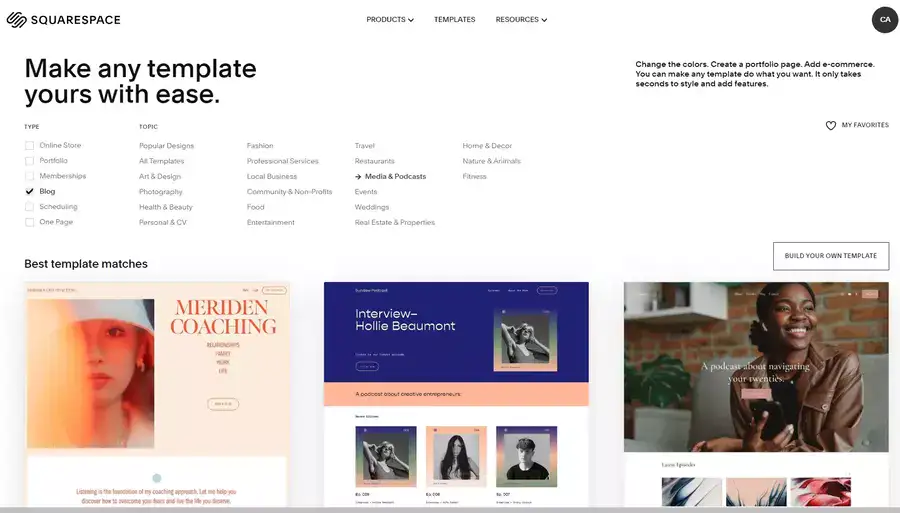Are you looking to take your affiliate marketing game to the next level? Look no further than our top pick for the best website builder for affiliate marketing. With its user-friendly interface and powerful features, this website builder has quickly become a favorite among affiliate marketers.
In fact, a recent survey of affiliate marketers found that over 80% reported an increase in revenue since switching to WordPress. But what sets it apart from other builders on the market? From customizable templates to integrations with popular affiliate networks, this builder has everything you need to create a professional-looking affiliate website that drives conversions. Keep reading for our in-depth review and see why this website builder is a game-changer for affiliate marketers.

Squarespace

Shopify

Strikingly
Wix

Weebly

HostGator

Site123
WordPress

As we researched the best website builders for yoga teachers, we found that WordPress is a leading option for those seeking a customizable and flexible platform. With nearly 30% of the online community using WordPress, it's no surprise that it's frequently recommended by businesses, such as Wildheart, who cater to the yoga community.
One benefit of WordPress is that it's a software package that can be installed on a web server of your choice. This gives you more control over your website and allows you to choose your own domain name. Self-hosting also allows for greater customization options with themes and plugins. For yoga teachers who want to stand out and showcase their unique brand, this level of customization is essential.

In terms of functionality, WordPress offers a selection of useful tools for yoga teachers. One plugin option is "The Events Calendar," which enables yoga teachers to create and manage classes and workshops. Another popular plugin is "Gutenberg," which simplifies the process of creating engaging and visually appealing blog posts.
In addition to its practical features, WordPress also boasts an active and supportive community. This means that it's easy to find solutions and support if you come across any issues or problems while using the platform. With a wealth of tutorials, forums, and resources available, WordPress makes it easy to learn and expand your skills.
Overall, when considering the best website builders for yoga teachers, WordPress emerges as a strong contender. With its customization options, practical features, and supportive community, it's a great platform for those seeking to create a website that truly reflects their brand and values.
Ghost CMS

Ghost CMS has emerged as a compelling option for those who want to build affiliate marketing websites. In its essence, Ghost is a robust, open-source blogging platform that supports modern publishing requirements, but its vast feature set goes well beyond simple blogging.
For affiliate marketers, the primary advantage of Ghost is its simplicity and focus on content creation. This CMS allows writers to seamlessly integrate affiliate links into high-quality content, which is a key element of successful affiliate marketing. With Ghost, you can easily create SEO-friendly posts and pages, thanks to its built-in SEO features. This is vital as organic search traffic plays a significant role in successful affiliate marketing.
The flexibility of Ghost is another major plus. This CMS allows for custom templates and integrations, making it easier for marketers to design their sites based on the specific needs of their target audience. For instance, you could create a review template with sections for pros, cons, and affiliate links, which could then be re-used for each new product you cover.

One of the distinguishing features of Ghost is the ability to run membership and subscription-based websites. This feature can be used strategically in affiliate marketing to build a dedicated user base, to whom you can deliver exclusive content or offers.
The architecture of Ghost, being built on Node.js, makes it incredibly fast and responsive, which is great for user experience and also for SEO. However, this might pose a bit of a learning curve if you're more accustomed to PHP-based CMS like WordPress. Ghost's interface is highly intuitive, but if you need to dig into the code, you might require some technical assistance.
Ghost is not an e-commerce platform, so if your affiliate marketing strategy involves running an online store, you might have to consider other platforms or use integrations. Moreover, while Ghost’s open-source version is free, hosting it can be a challenge for non-technical users. Ghost(Pro), the managed version, can be quite costly compared to other hosting options.
In terms of monetization and analytics, Ghost seamlessly integrates with tools like Google Analytics, allowing you to track your website's performance. Moreover, it has built-in AMP support for improved mobile performance.
All things considered, Ghost CMS provides a robust and flexible environment for content-focused affiliate marketing. It marries the principles of modern content marketing with the flexibility and performance of cutting-edge web technology. However, its success as a tool for affiliate marketing depends on the marketer's ability to leverage its strengths - namely its focus on content and SEO, customizable nature, and membership capabilities. You may need to complement Ghost with other tools or platforms to cover areas it doesn't naturally excel in, like e-commerce.
Shopify

If you're a yoga teacher looking to build a website to promote your classes, workshops, and services, there are a plethora of website builders out there to choose from. However, Shopify is a fantastic option for those looking to build a professional, user-friendly, and visually appealing website that can compete with some of the best in the business.
Shopify has been in the ecommerce business for over a decade, and their website builder has been designed specifically for online sellers. While it may seem like a less-than-ideal option for a yoga teacher, it’s worth noting that the platform has several strengths that make it a desirable choice for such businesses.
For starters, Shopify has an intuitive interface that makes it easy for anyone to build a website, even if you don't have any coding or web design experience. With its drag-and-drop editor, adding images, videos, and other elements to your site is a breeze.

Another advantage of Shopify is its wide range of templates. The platform offers over 70 visually stunning templates that are easy to customize and which are geared towards businesses in a variety of niches. With easy-to-use customization features, the yoga teacher can easily create a site that is both beautiful and functional.
The platform's ecommerce functionality is also something to consider. While this might not seem relevant to a yoga teacher, it’s worth noting that Shopify’s online store functionality is one of the most robust and comprehensive in the business, which means that even if you don't have any plans to sell physical products, the options to sell digital products, such as instructional videos or ebooks, can be seamlessly integrated into your site.
It is important to note that while Shopify has some competitors such as Wix, Squarespace, and Weebly, the platform’s strength lies in its ecommerce functionalities. If you're looking for a purely informational or blog-style site, another website builder may be a better option.
All in all, Shopify is a solid choice for a yoga teacher looking to build a professional website that showcases their offerings in a visually appealing and user-friendly way, with the added bonus of seamless online store integration. While other website builders such as Wix, GoDaddy, BigCommerce, and Square Online, might be worth considering, Shopify’s unique features set it apart from the rest. So, if you're looking for a website builder that is both powerful and user-friendly, give Shopify a try.
Squarespace

Squarespace is a website builder that is gaining popularity among yoga teachers looking to create a clean and immersive online presence. This online building tool includes both hosting and domain name, making it a good option for those who want an all-in-one solution. The pricing starts at £10/month for a basic website or £20/month for an online store, but users can try Squarespace for free for 14 days to see if it's right for them.
One aspect of Squarespace that stands out is its design templates, which are known for their immersive design that prioritizes white space and minimizes visual clutter on a page. This feature is particularly ideal for yoga websites, as it allows the focus to be on the content and services offered, rather than on distracting graphics or needless information.
Take for example Feel Good Yoga, a Switzerland-based yoga studio that used Squarespace to create a minimalistic website design that accurately portrays the studio's services and allows people to book classes. The website includes an 'About Us' page, links to social media pages, an embedded YouTube video, an email capture form, and an integrated booking schedule for yoga classes. This design makes it easy for potential clients to get the information they need and book classes with ease.

Another example of a successful yoga website created with Squarespace is ONE Yoga's site. With the help of Squarespace and some ideas from ONE Yoga, yoga teachers can implement several of these fine features into their own website.
While Squarespace's design templates are limited, the platform remains a fantastic option for yoga teachers looking for a simplistic yet sophisticated website design. Plus, users get a free domain name for a year (renewals can be pricey), and the platform takes care of hosting and maintenance, taking a lot of the hassle out of website creation.
However, it's important to note that Squarespace is not open-source, and users do not retain control of their websites. But for yoga teachers who are looking for a reliable, easy-to-use platform to create an immersive online presence, Squarespace should definitely be on their list.
Which website is best for affiliate marketing?
There are numerous websites for affiliate marketing. Some of the most popular include Amazon, Clickbank, ShareASale, and Commission Junction. Each platform has its own set of advantages and disadvantages, so it's important to research each one thoroughly before deciding which one to use.
How can I create a website for affiliate marketing?
Creating a website for affiliate marketing is relatively easy with the help of website builders such as WordPress, Wix, and Squarespace. These platforms offer customizable templates and easy-to-use tools that allow you to create a professional-looking website without any technical skills. Once your website is up and running, you can start promoting your affiliate products and services.

Can I make a website only for affiliate marketing?
Absolutely! In fact, many successful affiliate marketers focus solely on their website as their primary way of promoting affiliate products and services. With the right strategy and a solid understanding of your niche, you can create a website that attracts an audience and generates revenue through affiliate marketing.
Which affiliate platform is best for affiliate marketing?
It depends on your niche and marketing strategy. Amazon Associates is a popular option for those promoting physical products, while Clickbank caters more towards digital products. ShareASale and Commission Junction offer a wide range of products to promote across various niches. Research each platform and compare their commission rates, payment methods, and available products to find the best fit for your needs.
Can I affiliate on any website?
Not every website allows for affiliate marketing, so it's important to read their terms and conditions before promoting affiliate products or services on their platform. However, many websites do welcome affiliates and even have their own affiliate programs that offer unique benefits and commissions. It's always best to check with the website or company directly before promoting their products as an affiliate.


